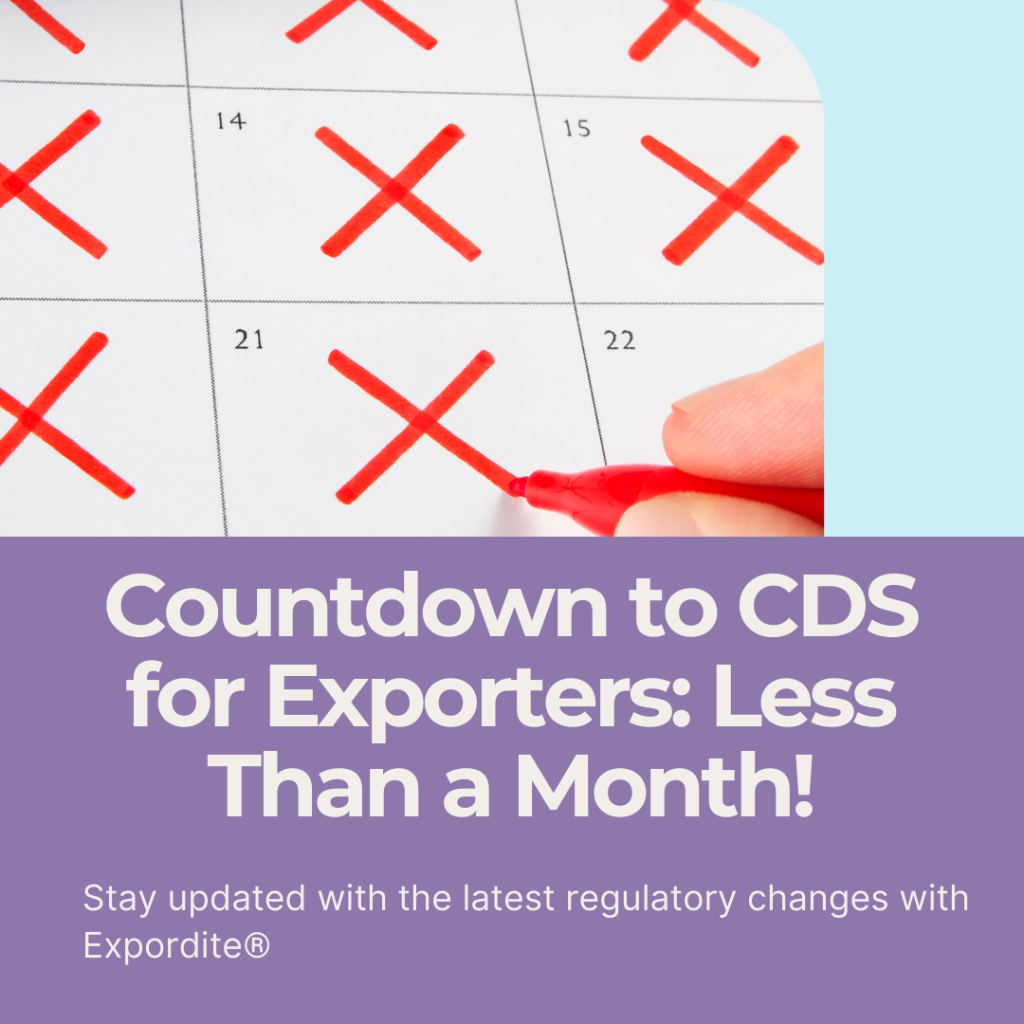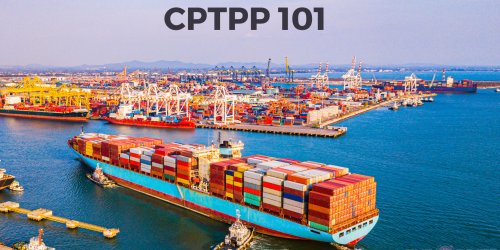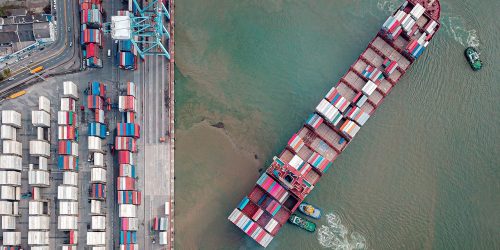10 UK Export News You Might’ve Missed – Week 19

In this edition of Export News from Expordite, we’ll cover the top 10 UK export news and headlines from week 19 of 2024 — May 6th-12th, 2024.
Key News
-
Less than one month to go for exporters to move to the Customs Declaration Service
-
Russian oil still seeping into UK – the reasons why sanctions are not working
General Export News
1. Less than one month to go for exporters to move to the Customs Declaration Service
“Businesses exporting goods have less than one month left to move across to the Customs Declaration Service (CDS), HM Revenue and Customs (HMRC) announced today.
Export declarations must be submitted through CDS from 4 June this year, when it replaces the Customs Handling Import and Export Freight (CHIEF) system for all trade declarations.
CDS provides businesses with a more user-friendly, streamlined system with greater functionality. It has been running since 2018 for import declarations and more than 117 million customs declarations have already been submitted through CDS.“
Source: GOV.uk
2. Ship outfitter lands £1 million growth funding with UK Export Finance support
“UK Export Finance (UKEF), the UK’s export credit agency, has helped specialist interior outfitter Trimline to secure a £1 million financing package supporting its work refurbishing cruise ships and ferries around the world. Lloyds Bank provided the facility, which is supported by UKEF and allows Trimline to target new business opportunities as demand continues rising almost two years after the COVID pandemic officially ended.
With the funding, Trimline will be able to take on two additional large-scale projects over the next 12 months involving around 400 individual contractors and 40-50 other UK-based companies. Without the funding, it may have had to turn those contracts down and potentially lose them to overseas competition.
The announcement exemplifies the value UKEF brings to specialist businesses and small and medium-sized enterprises (SMEs) around the UK, enabling them to continue standing shoulder-to-shoulder with competitors on the world stage. 85% of the companies which UKEF supported in 2022-23 were SMEs like Trimline – and under new plans published in April, the export credit agency is now aiming to support up to 1,000 SMEs a year by 2029.“
Source: GOV.uk
3. Russian oil still seeping into UK – the reasons why sanctions are not working
“The Russian state has been making more money from its oil and gas industry in the past three months than in any comparable period since the early days of the Ukraine invasion, it has emerged.
The figures underline that despite the imposition of various sanctions on fossil fuel exports from Russia since February 2022, the country is still making significant sums from them. This is in part because rather than preventing Russia from exporting oil, gas and coal, they have simply changed the geography of the global fossil fuels business.“
Source: Sky News
4. Second US-UK Strategic Sanctions Dialogue: joint statement
“Joint statement by the US Department of State and UK Foreign, Commonwealth and Development Office:
On Wednesday 8 May 2024, the UK government hosted a senior US government delegation for the second US-UK Strategic Sanctions Dialogue.
Talks, which took place in London and followed the inaugural Dialogue held in Washington DC in July 2023, delivered on the commitment under the 2023 Atlantic Declaration for a Twenty-First Century US-UK Economic Partnership to strengthen coordination on sanctions and export controls. This brought together both countries’ departments and agencies for strategic discussions on priorities across geographic and thematic sanctions and export controls regimes. The UK delegation was led by the Foreign, Commonwealth and Development Office, and included senior officials from His Majesty’s Treasury, and the Department for Business and Trade. The US delegation was led by the State Department and included senior officials from the US Department of the Treasury and Department of Commerce. “
Source: GOV.uk
5. UK should help update ‘global rulebook’ on digital trade – report
“The UK should work with other countries to update the “global rulebook” on buying and selling goods and services online to counter the risk of “incompatible, protectionist and discriminatory” regulations emerging across the world, a report suggests.
Without the implementation of “modern norms, rules and standards”, regulations could become more “fragmented”, as well as “less effective” at keeping people and businesses safe, according to a paper to be published on Friday by the Board of Trade.
The Board of Trade, which works alongside the Department for International Trade, warns in its report that if digital trade is to become the “new normal”, rules must be created to enable countries at all stages of development to benefit.“
Source: Yahoo News
6. Boost to UK sheep farmers as FTA unlikely to affect EU trade
“Improved access for New Zealand sheep meat, beef and dairy to the EU as part of the new NZ/EU Free Trade Agreement (FTA), is unlikely to pose a threat to UK exports.
That was the good news story from AHDB which claims that the FTA, which came into force last week, is not expected to harm UK shipments to the EU when New Zealand exports are of a different type.
The EU is the UK’s largest market for sheep meat, with 79,700 tonnes of fresh and frozen product shipped in 2023 valued at £524m. This compares to New Zealand, which shipped 54,000 tonnes of product to the EU last year. The largest cut exported from the UK is in the form of fresh lamb carcases, which accounts for 84% of total UK sheep meat exports to the EU.“
Source: The Scottish Farmer
7. The post-Brexit hard sell for British food in Asia
“In Asia, discussing food is like discussing the weather – it can get people talking for hours.
But when the BBC recently visited one of the region’s leading food and drink events, it became clear that there are some cuisines that leave even the foodies speechless.
“British food?” asks one Thai woman with a perplexed pause. “Um… I’m not really sure what that is. Is that, like, sausage?”
These are sobering words for British exporters, who were promised easy access to lucrative new markets after Brexit.
The reality is that the UK still lags far behind its main European counterparts, both in terms of sales and reputation.“
Source: BBC News
8. One year on from the Australia-UK Free Trade Agreement
“In the 12 months since the historic Australia-UK Free Trade Agreement (A-UK FTA) came into force, unlocking 20,600MT of tariff-free exports for Australian beef and 14,700MT for sheep meat, Australian red meat imports have grown steadily, finding a complementary place alongside UK offerings in foodservice and on retail shelves.
Brand Aussie Beef & Lamb and Meat & Livestock Australia’s (MLA) Business Manager – UK, Stephen Edwards, said the A-UK FTA “had set a place at the table” for Australian red meat alongside local and imported red meat products.
Since the A-UK FTA entered into force in May 2023, grainfed beef exports have increased from a total of 600t in June 2022 to March 2023 to 1400t in 2023-24. For the same period, grassfed beef exports increased from 32t to 1750t, while sheep meat exports grew from 7000t to 12,500t.“
Source: New Food Magazine
9. UK flower industry thrown into chaos by new Brexit border checks
“Of all the effects of Brexit, probably the least anticipated was that flower exporters and customs officials would have to learn Latin.
But that is one of the problems that confronted British businesses in the first week after the government introduced physical checks on some food and plants from the EU.
Traders said they had faced far more checks than they were led to believe would take place and in some cases lorries had been held for hours before being waved on without inspection.
The Department for the Environment, Food and Rural Affairs had told the industry that it would aim to check between 3% and 5% of consignments containing “medium-risk” products such as cut flowers.
On Saturday, Defra insisted it was meeting this target, but some flower wholesalers said every one of their lorries had been pulled aside for checking and that customers had missed deliveries because their flowers were stuck at the new £147m facility at Sevington in Kent.“
Source: The Guardian
10. UK first in Europe to invest in next generation of nuclear fuel
“The UK will be the first European nation to produce advanced nuclear fuel – a market currently dominated by Russia – to help fuel nuclear power plants at home and abroad. This is part of the government plan to push Putin out of the global energy market and drive down energy bills.
The government is awarding £196 million to Urenco to build a uranium enrichment facility. This will produce fuel by 2031 that would be ready to export or use domestically, and could power UK homes in the next decade. It will put an end to Russia’s reign as the only commercial producer of high-assay low enriched uranium (HALEU) and ensure other countries are not reliant on Russian exports.“
Source: GOV.uk
Want to get more international trade content straight to your inbox?






